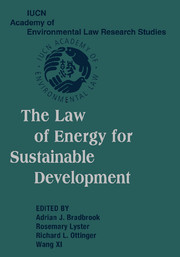Book contents
- Frontmatter
- Contents
- Acknowledgments
- Message from Kofi A. Annan, Secretary-General, United Nations
- Introduction – A Global Learned Society to Address Earth's Evolution: The IUCN Academy of Environmental Law
- Public Lectures on International Environmental Law
- PART ONE SUSTAINABLE DEVELOPMENT AND THE ROLE OF ENERGY LAW
- PART TWO LEGAL ISSUES IN CONTEMPORARY ENERGY LAW
- PART THREE INTERNATIONAL ENERGY LAW
- PART FOUR COMPARATIVE ENERGY LAW
- PART FIVE ELECTRICITY RESTRUCTURING
- PART SIX FINANCING FOR SUSTAINABLE ENERGY
- 27 Financing Clean Energy for Development
- 28 Legal Aspects of International Project Finance for Sustainable Energy Development
- 29 Emissions Trading Systems
- PART SEVEN CIVIL SOCIETY AND THE PROCEDURAL REQUIREMENTS OF ENERGY LAW FOR SUSTAINABLE DEVELOPMENT
- Index
27 - Financing Clean Energy for Development
Published online by Cambridge University Press: 10 August 2009
- Frontmatter
- Contents
- Acknowledgments
- Message from Kofi A. Annan, Secretary-General, United Nations
- Introduction – A Global Learned Society to Address Earth's Evolution: The IUCN Academy of Environmental Law
- Public Lectures on International Environmental Law
- PART ONE SUSTAINABLE DEVELOPMENT AND THE ROLE OF ENERGY LAW
- PART TWO LEGAL ISSUES IN CONTEMPORARY ENERGY LAW
- PART THREE INTERNATIONAL ENERGY LAW
- PART FOUR COMPARATIVE ENERGY LAW
- PART FIVE ELECTRICITY RESTRUCTURING
- PART SIX FINANCING FOR SUSTAINABLE ENERGY
- 27 Financing Clean Energy for Development
- 28 Legal Aspects of International Project Finance for Sustainable Energy Development
- 29 Emissions Trading Systems
- PART SEVEN CIVIL SOCIETY AND THE PROCEDURAL REQUIREMENTS OF ENERGY LAW FOR SUSTAINABLE DEVELOPMENT
- Index
Summary
INTRODUCTION
Finance is a critical element in the range of strategies designed to make clean energy available for development. For this to occur, renewable energy technologies (RETs) must be available at competitive prices. Further, policy environments must allow clean energy to compete on fair terms recognizing, if possible, the societal and environmental benefits of clean energy. At a minimum, policies should avoid approving subsidies to more established, more pollution intensive alternatives. Human resources and institutions also have important roles to play in establishing effective private enterprises and distribution channels.
There are numerous sources of complexity in analyzing the availability of financing for clean energy investments. Because clean energy services tend to be relatively capital intensive, substituting capital for fuel, the cost and availability of capital is often a significant issue in economic comparisons with more conventional alternatives. Until fully proven over time, new technologies, including those for clean energy, also have a risk premium that adds to financing costs. Finally, in allocating capital, commercial enterprises often demand higher rates of return for energy investments than for investments that relate to their core business objectives.
As the energy sector is increasingly being privatized, the availability of financing has become an indicator of overall market maturity and investor confidence. At the same time, the limitations of overreliance on private financing for the provision of energy services have also become increasingly apparent, including the continued need for public subsidies to support poverty alleviation and the highly volatile character of much commercial investment.
- Type
- Chapter
- Information
- The Law of Energy for Sustainable Development , pp. 473 - 486Publisher: Cambridge University PressPrint publication year: 2005

